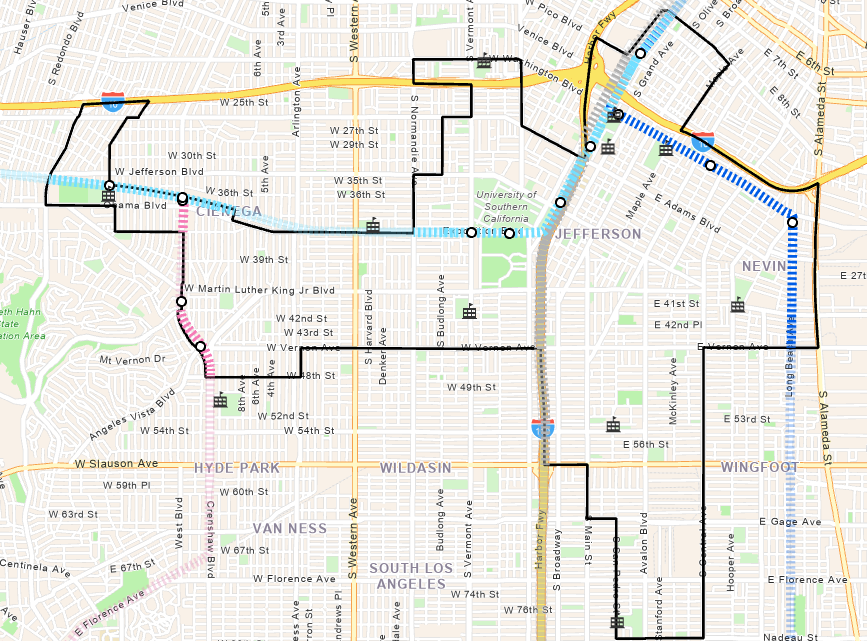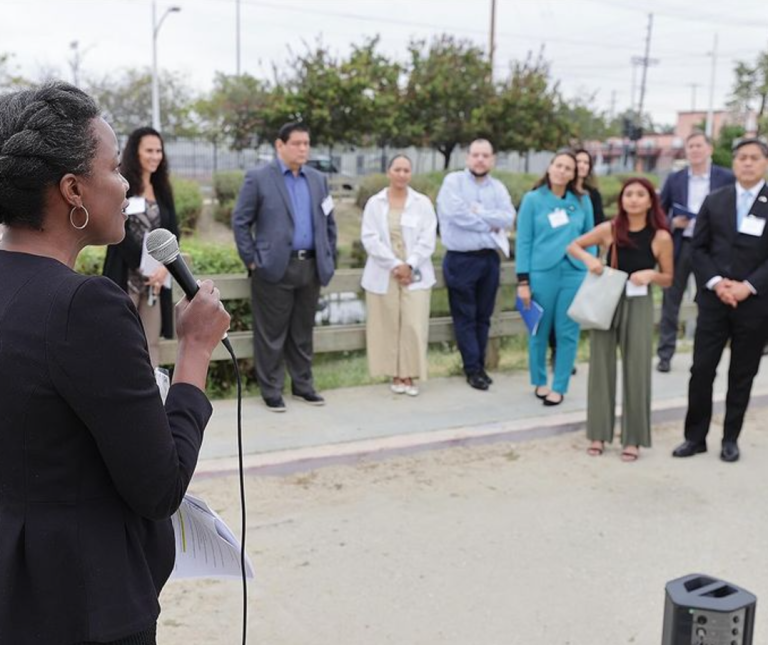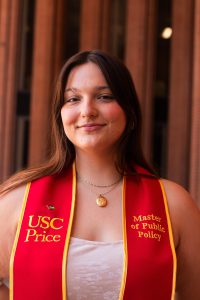A Legacy of Cultural Richness
South Los Angeles has long been a place of cultural vibrancy, tracing its roots to the early 20th century, when tens of thousands of Black Americans migrated to Los Angeles. Restricted by discriminatory housing practices, residents were confined to neighborhoods around Central Avenue where they developed a thriving community known as South Central—an epicenter for jazz, civil rights activism, and a key manufacturing hub anchored by the Goodyear plant. This region fostered a strong middle class and became known as the “Harlem of the West,” a cultural and intellectual hub that celebrated Black artistry and empowerment.

However, mid-century shifts hit South LA hard: factory closures led to job losses, and the construction of freeways, like the 110, through Black neighborhoods disrupted the community fabric. The resulting unemployment and police tensions spurred the Watts Uprising in 1965, highlighting systemic inequities that still resonate today.
The social and economic upheaval experienced in South LA during the mid-20th century had a lasting impact on the community, underscoring the urgent need for community-driven systems change. Over time, residents and local leaders sought solutions to tackle historical disinvestment, economic challenges, and environmental injustices to ensure that life in South LA translated into meaningful opportunities. Out of this legacy of advocacy and self-determination, the South Los Angeles Transit Empowerment Zone (SLATE-Z) emerged.
Founded in 2014, as a cross-sector alliance with over 100 partners, SLATE-Z focuses on creating economic pathways for residents by fostering living-wage job opportunities, workforce development, and entrepreneurship. Since 2016, SLATE-Z has helped over 9,300 people secure employment in high-demand sectors — including construction, healthcare, and green industries — addressing critical workforce needs while promoting sustainability.
1910
Large numbers of Black Americans migrate to Los Angeles fleeing racial violence in hopes of securing better opportunities.
2018
SLATE-Z successfully works with Move LA and LA Promise Fund to build the “Just Transit” Universal Pass Pilot Program (U-Pass).
A Story of Workforce, Environment, and Transit in South Los Angeles
Founded in 2014, the South Los Angeles Transit Empowerment Zone (SLATE-Z) is a historic and unprecedented cross-sector collaboration with over 100 public, private, academic, and community partners working to revitalize South Los Angeles by moving the region’s 234,000 residents to economic opportunity. SLATE-Z is a collective impact organization working at the intersection of economic revitalization and environmental sustainability. Their holistic form of governance addresses the whole being through five “levers of change”: Education, Jobs, Public Safety, Small Business & Entrepreneurship, and Transit. This approach is centered on ensuring residents have access to unlimited earning opportunities, living wage jobs, reliable transit, and safe communities.

Demarcated by the Los Angeles Metro’s K, E, and A-lines, the promise zone accounts for nearly 6% of the City’s entire population. Today, the Promise Zone is predominantly comprised of Latino/a’s, with 71% of residents identifying as Hispanic/Latino and about 14% of residents identifying as Black/African American, nearly double the Los Angeles County Average.
Addressing the Impacts of Economic Disinvestment
The SLATE-Z Promise Zone has historically experienced economic disinvestment due to decades of structural racism and oppression. As a result, 54% of residents are earning below the 200% federal poverty threshold compared to 32% of residents in Los Angeles County. Moreover, the median household income in the SLATE-Z area in 2022 was $56,430, an increase from $56,243 in 2021 but still nearly $27,000 below the Los Angeles County Average. Median Household Income from 2010 to 2022 for the SLATE-Z Promise Zone relative to Los Angeles County is shown on the map below.
Income disparities are partially attributed to residents in the Promise Zone experiencing higher rates of unemployment than both the City and County average. In 2022, 10% of residents in the South Los Angeles Promise Zone were unemployed compared to the Los Angeles County average of 7%, see the unemployment rate in the Promise Zone by census tracts on the map below. In response to the higher rates of unemployment and poverty in the area, SLATE-Z and its partners have worked diligently over the last decade to move residents into living wage jobs by institutionalizing pipelines and workforce development programs. To learn more about specific workforce development programs and job creation in the Promise Zone, view the Jobs Dashboard.
The Path to Environmental Justice in South LA
The Promise Zone faces significant challenges, including poor air quality, contaminated drinking water, and limited green space. Residents experience exposure to toxic releases at a rate higher than 65% of other areas in LA County. Living in proximity to these pollutants heightens the risk of poor health outcomes, such as heart and lung disease, cancer, and increased mortality. Moreover, Only 10% of the Promise Zone is covered by green vegetation, nearly half the Los Angeles County Average. Explore green coverage by census tract in the Promise Zone on the map below.
South Los Angeles Eco-Lab
To address environmental hazards facing the region, SLATE-Z, alongside a number of partners, launched the South LA Eco-Lab, a historic revitalization project aimed at transforming South Los Angeles into a climate-resilient community by increasing investment in the heart of South Los Angeles. The initiative is funded by a $35 million grant from the California Strategic Growth Council’s Transformative Climate Communities Program (TCC), a collective impact approach that empowers communities to drive their own solutions.
The project will introduce 6,000 trees to the region by planting 4,000 shade and fruit trees and distributing 2,000 directly to community members. It will also enhance public access to green spaces, install solar and cooling roofs and EV charging stations, expand e-bike availability, and provide free Metro passes to more than 10,000 residents. Additionally, the initiative will offer free tenant rights workshops, empowering renters with valuable knowledge and resources. Building on years of collaboration and cross-sector partnerships, this project embodies a unified vision and a shared commitment to transforming South LA into a thriving, climate-resilient community where residents can live, work, and play.

LADOT Universal Basic Mobility
In addition to their work with the South LA Eco-Lab, SLATE-Z also partnered with the Los Angeles Department of Transportation (LADOT) in 2022 to launch the Universal Basic Mobility (UBM) Pilot in South LA. This $17.8 million initiative is designed to increase access to sustainable transit options, benefiting over 2,000 low-income residents specifically through the Mobility Wallet Program that provides subsidies for transportation services like rideshare, taxis, and bike shop purchases. The UBM Pilot also includes the introduction of e-bikes, street safety treatments, on-demand EV shuttle services, and subsidized transit fares. Considering nearly 12% of Promise Zone residents rely on public transit and 19% of households do not own a vehicle, these new transportation solutions aim to reduce commuting costs, improve mobility, and offer residents more sustainable ways to access jobs, education, and healthcare. The dashboard below depicts the percentage of workers that rely on public transit compared to the percentage of households without a vehicle in the Promise Zone.
Access to affordable and sustainable transit is increasingly critical, especially in areas like South LA, which faces the compounded burdens of climate change, poor air quality, and limited access to green spaces. By providing residents with more efficient and cost-effective transit options, SLATE-Z is helping reduce traffic congestion and improve environmental health. Beyond transforming the transportation landscape, the partnership also creates new workforce development opportunities, providing pathways to employment in the growing green economy, and contributing to the city’s broader efforts to combat climate change. This initiative is not only about improving mobility but also fostering a more equitable and sustainable future for South LA’s residents.
Creating 10,000 Jobs in South Los Angeles
By leveraging partnerships with community-based organizations and public agencies, SLATE-Z has spurred job creation through a handful of workforce programs, including the Targeted Local Hire Program (TLH), the Workforce Innovation and Opportunity Act (WIOA), Hire LA, and Sector-based Job Placements. From January 2016 to date, SLATE-Z has placed over 9,300 workers in jobs in the South LA Promise Zone. To read more about the impact of workforce development programs in South Los Angeles, view the Job Placement Type Dashboard.
Envisioning the Future of SLATE-Z
For decades, South Los Angeles has faced disinvestment, redlining, and deindustrialization, which has restricted economic mobility for residents. Over the last ten years, SLATE-Z has brought together a unique cross-sector alliance of public and private organizations alongside deeply-rooted community groups to stimulate the local economy and generate over 9,300 living-wage, GOOD jobs in the Promise Zone – offering residents meaningful work that sustains families and supports the community’s long-term stability.
Although South LA has been historically fragmented by politics, systemic racism, and poor urban planning, SLATE-Z envisions a bright future of a transformed community that can become a leader in the emerging green economy. By fostering the creation of green jobs, SLATE-Z aims to position South LA at the forefront of sustainability and environmental innovation, driving economic growth while addressing the region’s long-standing challenges.

Looking ahead, SLATE-Z is focused on directing the surge of investments anticipated as Los Angeles prepares for the 2028 Olympic Games. With billions of dollars slated for infrastructure and development, SLATE-Z is working to ensure that this influx benefits the Promise Zone and the residents of South LA. By prioritizing local hiring, small business support, and sustainable urban planning, SLATE-Z aims to empower and uplift South Los Angeles residents, ensuring that these investments lead to economic inclusion rather than displacement. SLATE-Z, alongside its partners, continues to pave the way for a more equitable and vibrant South Los Angeles.
Authors & Contributors

Emily Phillips
Emily (she/her) is the Project Specialist at Neighborhood Data for Social Change. Emily received her Master in Public Policy with a specialization in advocacy communications from the USC Price School in the Spring of 2024. Prior to relocating to Southern California, Emily grew up in Phoenix and then obtained her BA in Political Science and Global Studies from Loyola University Chicago. Her main focus incudes policy advocacy across a variety of policy areas including housing, health, and racial justice. She is passionate about community engagement and social impact.
Other contributors include: Elly Schoen, Caroline Ghanbary, Elinor Amir-Lobel, Nicole Ouyang, Cameron Yap & Ben Regev
Sources
Baldwin Hills Community Resilience and Access Plan. State of California Baldwin Hills & Urban Watersheds Conservancy. (n.d.). https://bhc.ca.gov/projects/baldwin-hills-community-resilience-and-access-plan/
Kayembe, A. (2023, February 28). 13 Historical Sites that made Central Avenue the cultural lifeline of South L.A. Los Angeles Times. https://www.latimes.com/entertainment-arts/story/2023-02-28/south-central-los-angeles-mapped-black-history-behold
LADOT and Metro announce application window for Mobility Wallet Transportation Subsidy Phase II. LADOT. (2024, July). https://ladot.lacity.gov/dotnews/mobility-wallet-transportation-subsidy-phase-II#:~:text=Mobility%20Wallets%20provide%20subsidies%20that,and%20purchases%20at%20bike%20shops.
La Promise Fund. LA Promise Fund. (2024, July 11). https://www.lapromisefund.org/
Lee, K. (2024, August 12). How Los Angeles Aims to Make a Profit on the 2028 Olympics. The New York Times. https://www.nytimes.com/2024/08/12/business/economy/olympics-los-angeles-2028-economy.html
South LA Eco-Lab. SLATE-Z. (n.d.-a). https://slatez.org/south-la-eco-lab
The Martin Luther King, Jr. Research and Education Institute. Watts Rebellion (Los Angeles). Stanford University. https://kinginstitute.stanford.edu/watts-rebellion-los-angeles
Universal Basic Mobility . SLATE-Z. (n.d.). https://slatez.org/ubm
Universal Basic Mobility Program. MoveLA. (n.d.). https://www.movela.org/

